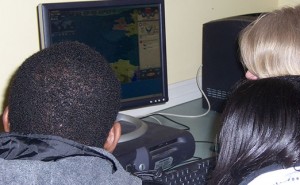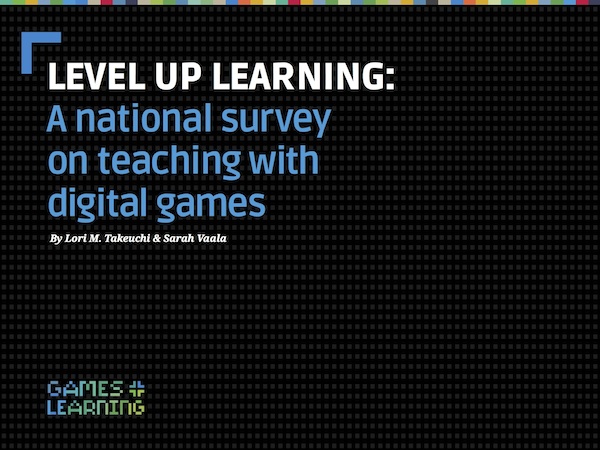A new study, called A-GAMES (Analyzing Games for Assessment in Math, ELA/Social Studies, and Science) has been funded by the Gates Foundation to study how video games support teachers’ classroom formative assessment practice. If you are a K-12 teacher, you can help shape and inform the research by completing a survey.

There is growing support for the use of digital video games as part of K-12 teachers’ classroom routines. As with all educational technologies, the most frequently asked question is, “Do they work?” The answer — and the question itself — is complex. Work for what purpose? To help students learn? Learn what? Core content knowledge or 21st century skills? To engage students? In comparison to what? As with all educational technologies, the real answer to any of these questions is, “It depends.” It depends on lots of factors, including the features of the game and, most importantly, what teachers do with those features as part of their instruction.
The A-GAMES project is designed to study how teachers really use video games in their teaching to support formative assessment. Formative assessment is a set of practices to gauge student progress toward learning goals, and to adjust instruction to meet students where they are. Formative assessment is arguably one of the most important parts of a teacher’s instructional tool kit. When used well, it has been found to be among the most powerful ways to improve student learning outcomes, and it may be particularly important to the success of low-ability students. But as with any “best practice,” in order to be effective, formative assessment approaches must be both useful and used. And that’s where games — potentially — come into play.
A-GAMES is a collaboration between the University of Michigan and New York University, with BrainPOP providing professional development and implementation support. The first phase of the project (going on right now) is a nationwide survey of K-12 teachers designed to identify common formative assessment practices and common uses of educational games. Our survey builds on and complements similar work by the Joan Ganz Cooney Center and the Gates-funded GlassLab, which recently released SimCityEDU with a focus on data analytics for assessment. We want to build a broad picture of teacher practice, and need lots of input! If you are a K-12 teacher, or know K-12 teachers (especially those who use video games in their teaching), please take our share our survey: http://create.nyu.edu/survey. The second phase of the work will be case studies of grade 5-8 teachers in the NYC area using games from BrainPOP’s GameUp platform in their classrooms. We will select eligible teachers from those who complete the survey and indicate an interest in participating in the case studies.
Educational game developers employ a range of features to help monitor and gauge learner/player progress. Many of these features are modeled after commercial video games, such as dashboards that allow a player to see areas of strength and weakness or leaderboards that show how one stacks up against other players. Other features are meant to be integrated with in-classroom practices that surround game play, such as having students respond to “check in” questions, provide brief reflections on their game play experience, or giving brief, content-focused quizzes. And there are a host of others. But not much is known about how various tools for formative assessment are actually used by teachers, or to what effect. A-GAMES focuses on how different features and designs for formative assessment are used by teachers, how those designs fit with teachers’ conceptions of formative assessment, and what barriers exist in classrooms that make it hard for teachers to use formative assessment features as intended.
We expect to be able to share results from the survey portion of the study in winter 2014, and findings from the case studies by next fall. Our goal is to inform future designs of formative assessment features in games to better match the needs and expectations of teachers, hopefully leading to improved formative assessment practice and better learning outcomes for students.
A-GAMES is a collaboration between the University of Michigan, where I am the Principal Investigator, and New York University, where Jan Plass and Michelle Riconscente are Co-Principal Investigators. The work is funded by the Bill & Melinda Gates Foundation. BrainPOP, a well-regarded member of the games and learning community, is generously serving as our implementation partner and providing access to their new GameUp platform to support the study.
Please help with the study by taking or sharing the survey before December 16. We will randomly select 8 survey participants to receive a $50 Amazon gift card: http://create.nyu.edu/survey
 Barry Fishman is an Associate Professor of Information and Education at the University of Michigan, Ann Arbor. His research focuses on games as model learning environments, on teacher learning with technology, and on the development of innovation through design-based implementation research.
Barry Fishman is an Associate Professor of Information and Education at the University of Michigan, Ann Arbor. His research focuses on games as model learning environments, on teacher learning with technology, and on the development of innovation through design-based implementation research.

